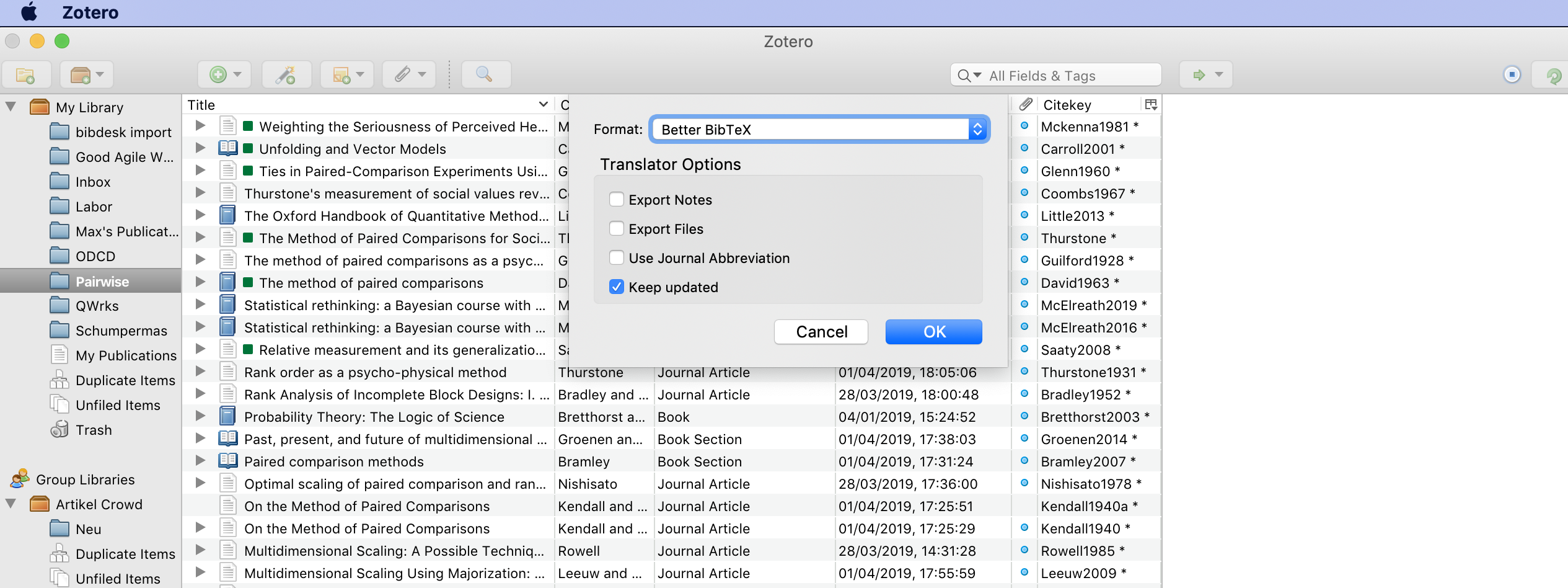Bibliography Setup
Thomas Roppelt
Friedrich-Alexander-Universität Erlangen-Nürnberg (FAU)Maximilian Held
Friedrich-Alexander-Universität Erlangen-Nürnberg (FAU)03 April, 2024
Bibliography managers (also known as reference management software) are important to keep all the literature you work with well organized. These programs help you keep bibliographic metadata (author, year, etc.) in a small database, sometimes also including links to full-text PDFs or your own annotations.
This page will help you understand pros and cons of different bibliography managers as well as help you set up Zotero, a free and open-source bibliography manager.
Comparison
There are many different bibliography managers available, including
Citavi, Colwiz, EndNote, JabRef, Mendeley, Zotero and ZoteroBib. Any
reference manager that is capable of exporting clean .bib
files, plain text files adhering to the BibTex format, will work
with a pandoc-based toolchain (such as ours).
However, you may want to consider using one of the open source reference managers. Reference collections are an investment (of your time) you might want to use for a long time (years or even decades), and the best way to ensure that is to a) use an open source program with b) an easy way to get out your data if you want to use a different tool.
Of the named software, only JabRef, Zotero and ZoteroBib are free and open source. For a detailed feature comparison, you may want to look here (german) or here (english). While the following paragraphs will cover Zotero, please feel free to use any of the other open source bibliography managers.
Zotero setup
To get started with Zotero, there are some components that should be set up:
Zotero
*Linux: Best way is to use the included package manager. Most likely you can find it there.
*Mac: Download from the Zotero website or using homebrew brew cask install zotero.
*Windows: Best way is to install via chocolatey package manager. Run
choco install zotero in the command line.
*Alternative way for all supported platforms: Download and install via the Zotero website
Better BibTex Add-on
This add-on makes it easier to work with plain-text based authoring formats such as Markdown and LaTeX. You should install it after installing Zotero.
Automatically Export .bib
Zotero maintains only one database for your entire system or Zotero user account. This makes a lot of sense, because you’ll often want to reuse references across different projects.
However, remember that every single project (say, a git
repository with some * rmds) will require it’s own
exported copy of that system-wide database, or a subset thereof. This is
because pandoc, or any other command-line conversion program
(such as rmarkdown, or LaTeX) will expect the
references in a plain text .bib file, not the
database that Zotero is using. Programs other than Zotero actually
cannot read or write to that database (which is a good thing).
Additionally, if you’re using git (as you should) with some CI/CD,
all files necessary to render a project to output formats
must be present in that project directory.
This problem is easily solved by exporting your entire
library (or parts of it, if you like), to .bib using the
above Better BibTex add-on. Get to the below menu by clicking File >
Export Library, and then save the file to your project root.

Zotero Export
Happily you can also have Zotero automatically
refresh this .bib, whenever your (system wide)
bibliography changes. If you’re using git, this will cause diffs from
your .bib, which you’ll have to add and commit by hand.
If you’re adventurous, you can also set up Better BibTex to automatically add, commit and push these changes for you, but this isn’t recommended. Git commits should always be deliberate, human interactions, not scripted artefacts.
Zotero Pickers
There are also various pickers (or autocomplete plugins) that will make it easier for you to insert citekeys in your text editor of choice.
Zotero Connector for Your Browser (optional, recommended)
This enables you to add the websites or PDFs you view in your browser directly to your bibliography. The connector will extract and add as much of the metadata as possible.
Using Zotero
This should be pretty straightforward. To learn about the available functions, have a look at the Zotero Quick Start Guide
Rendering Your Bibliography
Pandoc and other command-line text conversion tools will accept your
.bib file as an additional input, pass that to one of
several bibliography generation programs (such as BibTex,
Pandoc Citeproc or Biber) and insert the results into your output
formats of choice.
For example, in pandoc, you might run
pandoc homework.md --bibliography=mybib.bib -o .\Outputs\output.htmlwhere --bibliography=mybib.bib specifies that you want
to use your mybib.bib, expected at the project root. This
would be the file that you’d have exported from Zotero.